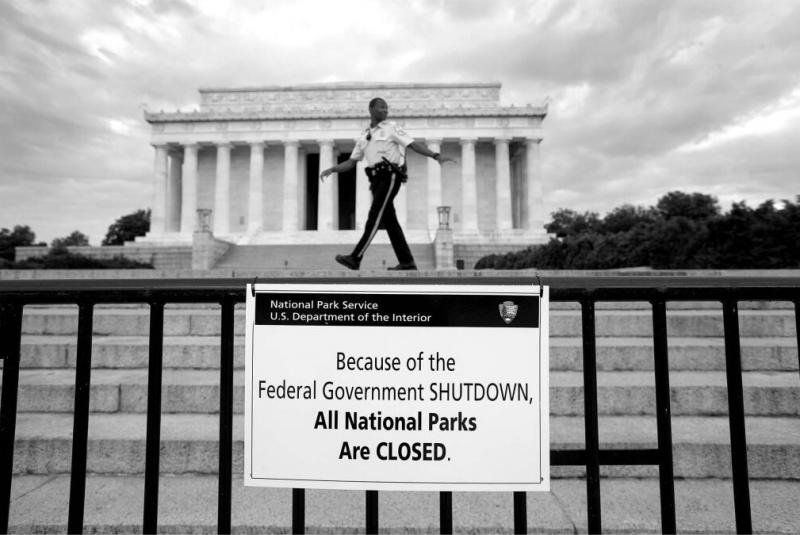
- Details
- By Levi Rickert
Opinion. Fueled by the demands of hard-right House Republicans, the federal government appears to be heading towards a shutdown at the end of the month, which marks the end of the federal government’s fiscal year.
Every year, Congress is supposed to pass 12 different spending bills that fund the government once signed by the president. When there is a lack of progress and the deadline is near, sometimes Congress will pass a temporary extension called a continuing resolution that allows the federal government to keep operating until a specified time.
This year, right-wing Republican House members don’t want to cooperate with even members of their own party, so a continuing resolution seems impossible. A shutdown is looming. While essential services will continue — including social security payments and medicare/medicaid payments — other payments deemed nonessential will stop during the shutdown.
With the threat of a shutdown looming, the U.S. Department of the Interior - Indian Affairs on Friday postponed an Oct. 1 “Road to Healing” listening session in Albuquerque, New Mexico.
The implications of a federal government shutdown were analyzed by the Native American Finance Officers Association (NAFOA) two weeks ago. Here’s what NAFOA said happens at the tribal level when there is a shutdown:
- Federally funded programs will not receive FY2024 funding until Congress approves it.
- If the tribe does not have any other funds available from prior years, the program would not have funds to operate unless the tribe used other funding sources to run the program.
- If the tribe has funds remaining from prior fiscal years they may be able to use those funds to pay employees until funds are exhausted.
- If their programs run out of previous year money, tribes may consider funding (partially or fully) these programs until funding is restored.
On Friday, several national Native organizations, collectively serving the interests of Indian Country, joined in unison in a joint statement to oppose a federal government shutdown, spending cuts for tribal programs, and to remind Congress that Native lives are not a political bargaining chip.
The national Native organizations are: American Indian Higher Education Consortium (AIHEC), National American Indian Housing Council (NAIHC), Native American Rights Fund (NARF), National Council of Urban Indian Health (NCUIH) National Congress of American Indians (NCAI), National Indian Health Board (NIHB), Native American Rights Fund (NARF), National Indian Education Association (NIEA), and Self-Governance Communication and Education Tribal Consortium.
“Tribal Nations paid, in full, for the duties owed and enforced by the United States. We paid with our lives, with our lands, with our resources, and with our ways of life. We paid long before political factions sought to divide this nation, and your debt is due. We continue to serve this nation’s military in the highest numbers of any U.S. demographic, and we put program dollars to better use for our people than the United States ever has. Congress must uphold its end of the deal. Native lives are not a political bargaining chip,” NCAI President Fawn Sharp said in the joint statement.
The organizations said the United States has created a system where millions of Americans are uniquely reliant on federal appropriations. Tribal law enforcement and courts will switch to emergency operating plans. Primary, secondary, and higher education will switch to emergency operating plans. Tribal housing programs will switch to emergency operating plans.
Life-saving programs for at-risk community members will switch to emergency operating plans. The unique history and political status of tribal nations and the government-to-government relationship with the United States means that no aspect of a shutdown happens in a vacuum for Indian Country and all tribal nations are affected.
Past government shutdowns have taken the lives of Native citizens, harmed their well-being, and forced tribal governments, tribal organizations, and individual citizens to go into debt to cover the United States’ broken promises. Without the historic enactment of advance appropriations for the Indian Health Service, all tribal programs would be facing, yet another, threat of government shutdown. Even still, critical and lifesaving programs will be disrupted throughout Indian Country, and tribal nations will pay to maintain operations in either borrowing costs or lives lost.
Earlier this week, Republican Senate Leader Mitch O’Connell said no one ever wins when the federal government shutdown.
A recent Peterson Foundation poll says 90 percent of Americans do not want a federal government shutdown.
Government shutdowns are bad for Indian Country and the whole country.
Thayék gde nwéndëmen - We are all related.
More Stories Like This
Tribal Economic Development Programs in the Federal Contracting Environment: What They Are, and What They Are NotWhy Redefining Public Health Degrees Would Harm Native and Rural Communities
The SAVE America Act Threatens Native Voting Rights — We Must Fight Back
The Presidential Election of 1789
Cherokee Nation: Telling the Full Story During Black History Month
Help us defend tribal sovereignty.
At Native News Online, our mission is rooted in telling the stories that strengthen sovereignty and uplift Indigenous voices — not just at year’s end, but every single day.
Because of your generosity last year, we were able to keep our reporters on the ground in tribal communities, at national gatherings and in the halls of Congress — covering the issues that matter most to Indian Country: sovereignty, culture, education, health and economic opportunity.
That support sustained us through a tough year in 2025. Now, as we look to the year ahead, we need your help right now to ensure warrior journalism remains strong — reporting that defends tribal sovereignty, amplifies Native truth, and holds power accountable.
 The stakes couldn't be higher. Your support keeps Native voices heard, Native stories told and Native sovereignty defended.
The stakes couldn't be higher. Your support keeps Native voices heard, Native stories told and Native sovereignty defended.
Stand with Warrior Journalism today.
Levi Rickert (Potawatomi), Editor & Publisher


